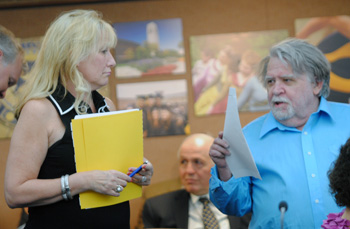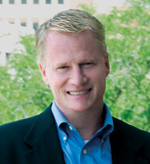University of Michigan board of regents meeting (June 16, 2011): Despite dissent from two regents, the board approved tuition and fee increases for the coming school year, as part of its FY 2012 budget. Regents Denise Ilitch and Larry Deitch objected to the increase, saying it would become more difficult for middle- and working-class families to afford a Michigan education.

University of Michigan regent Denise Ilitch, who was elected chair at the June 16, 2011 meeting, listens to local resident Tom Partridge, a frequent public commenter at meetings of various governing boards in and around Ann Arbor. He did not sign up to speak during public commentary at the regents meeting, but approached regents individually before the start of the session. (Photos by the writer.)
Tuition and fees will increase 6.7% for most in-state first- and second-year undergraduates at the Ann Arbor campus, for a total of $12,634 per year ($6,317 per term). Most out-of-state undergraduates will pay a total of $37,382 per year ($18,891 per term).
Voting against the tuition increases were regents Denise Ilitch and Larry Deitch. Ilitch has voted against increases for three straight years, but this is the first no vote for a tuition proposal that Deitch has cast in his 19-year tenure on the board. He objected to the higher percentage increase that in-state students were bearing compared to out-of-state students, as well as to the state-level budget process, which threatens additional state funding cuts for public universities if they raise tuition by more than 7%. He contends that the “cut-and-cap” approach results in tuition increases that are higher than they might otherwise be.
This is the second wave of increases for students this fall. At their May 19 meeting, regents had voted to raise residence hall rates at the Ann Arbor campus by 3%. The rate increase for Northwood Community Apartments – housing primarily for graduate students and families on UM’s north campus in Ann Arbor – is 1% for the 2011-12 academic year.
In presenting the budget at the June 16 meeting, university officials emphasized the context for these increases: The FY 2012 budget reflects a $47.5 million cut in UM’s state appropriation down to $268.8 million – a decline of 15% compared to FY 2011, and the lowest amount of state aid received since FY 1964, when adjusted for inflation. The budget attempts to soften the tuition hike by adding $9.2 million in student need-based financial aid.
Tuition makes up a large portion of the general fund operating budget. For the Ann Arbor campus, the budget of $1.58 billion in FY 2012, which begins July 1, reflects a 2.2% increase from FY 2011.
Regents also approved the FY 2012 budget for the UM Hospitals and Health Centers – revenues are projected at $2.169 billion, with a $23.5 million operating loss. The loss is due in large part to $89.4 million in costs related to the new C.S. Mott Children’s and Von Voigtlander Women’s Hospitals, which open in November.
UM athletic director Dave Brandon gave a briefing on the athletic department budget, though it doesn’t require separate regental approval. The budget calls for a $11.4 million surplus and projected revenues of $121 million, including $45.5 million from ticket sales.
In addition to budget items, the board conducted other business during Thursday’s meeting, approving several construction projects – including a major renovation of Yost Ice Arena – and electing new officers: Ilitch as chair, and Deitch as vice chair. In her first action as board chair, Ilitch asked to enter a statement into the record. Though she didn’t read the statement or refer to its topic at the meeting, it was a response to a May 27, 2011 editorial in the Detroit Free Press about a resolution approved at the regents’ May 19 meeting. The resolution supported the right of graduate student research assistants to unionize.
That issue also arose at the meeting during public commentary. Dan Benefiel – a member of the Willow Run Tea Party Caucus and the Washtenaw County Republican Party executive committee – told regents he’s concerned that their decision will eventually lead to the unionization of college athletes. He called the vote a “leftist intrusion on American educational institutions.” [Full Story]








